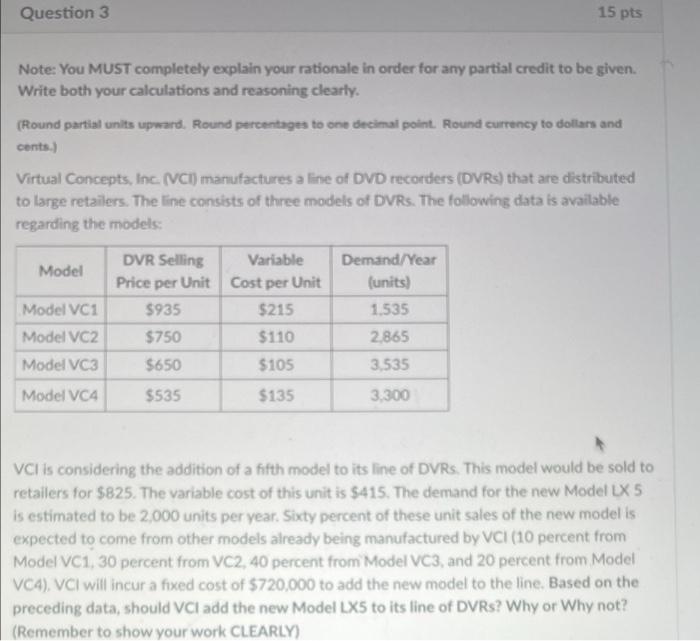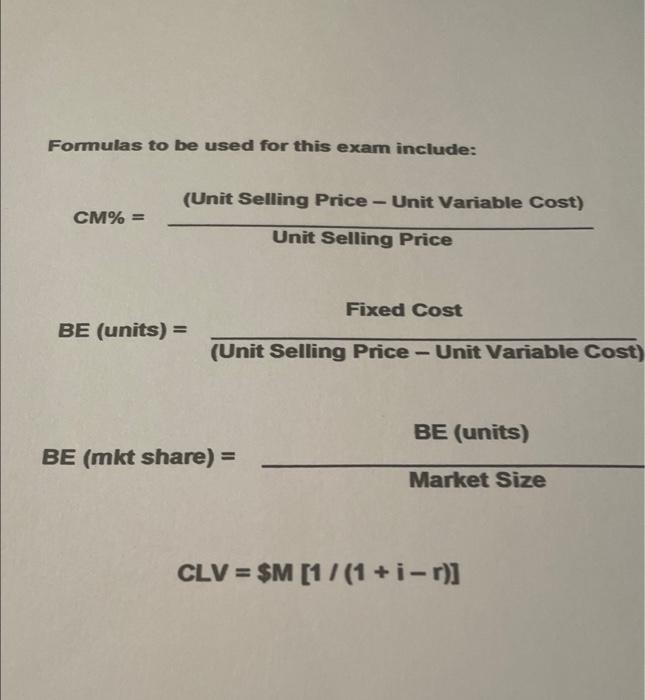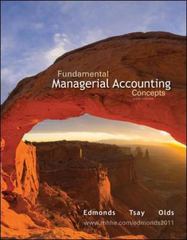Answered step by step
Verified Expert Solution
Question
1 Approved Answer
please give detail answer step by step thank you Question 3 15 pts Note: You MUST completely explain your rationale in order for any partial
please give detail answer step by step thank you 

Question 3 15 pts Note: You MUST completely explain your rationale in order for any partial credit to be given. Write both your calculations and reasoning clearly. (Round partial units upward. Round percentages to one decimal point. Round currency to dollars and cents.) Virtual Concepts, Inc. (VCI) manufactures a line of DVD recorders (DVRs) that are distributed to large retailers. The line consists of three models of DVRs. The following data is available regarding the models: DVR Selling Variable Demand/Year Model Price per Unit Cost per Unit (units) Model VC1 $935 $215 1.535 Model VC2 $750 $110 2,865 Model VC3 $650 $105 3,535 Model VC4 $535 $135 3,300 VCI is considering the addition of a fifth model to its line of DVRs. This model would be sold to retailers for $825. The variable cost of this unit is $415. The demand for the new Model LX 5 is estimated to be 2,000 units per year. Sixty percent of these unit sales of the new model is expected to come from other models already being manufactured by VCI (10 percent from Model VC1, 30 percent from VC2, 40 percent from Model VC3, and 20 percent from Model VC4), VCI will incur a fixed cost of $720,000 to add the new model to the line. Based on the preceding data, should VCI add the new Model LX5 to its line of DVRs? Why or Why not? (Remember to show your work CLEARLY) Formulas to be used for this exam include: CM% = BE (units) = BE (mkt share) = (Unit Selling Price Unit Variable Cost) Unit Selling Price Fixed Cost (Unit Selling Price - Unit Variable Cost) BE (units) Market Size CLV = $M [1/(1 + i r)] Question 3 15 pts Note: You MUST completely explain your rationale in order for any partial credit to be given. Write both your calculations and reasoning clearly. (Round partial units upward. Round percentages to one decimal point. Round currency to dollars and cents.) Virtual Concepts, Inc. (VCI) manufactures a line of DVD recorders (DVRs) that are distributed to large retailers. The line consists of three models of DVRs. The following data is available regarding the models: DVR Selling Variable Demand/Year Model Price per Unit Cost per Unit (units) Model VC1 $935 $215 1.535 Model VC2 $750 $110 2,865 Model VC3 $650 $105 3,535 Model VC4 $535 $135 3,300 VCI is considering the addition of a fifth model to its line of DVRs. This model would be sold to retailers for $825. The variable cost of this unit is $415. The demand for the new Model LX 5 is estimated to be 2,000 units per year. Sixty percent of these unit sales of the new model is expected to come from other models already being manufactured by VCI (10 percent from Model VC1, 30 percent from VC2, 40 percent from Model VC3, and 20 percent from Model VC4), VCI will incur a fixed cost of $720,000 to add the new model to the line. Based on the preceding data, should VCI add the new Model LX5 to its line of DVRs? Why or Why not? (Remember to show your work CLEARLY) Formulas to be used for this exam include: CM% = BE (units) = BE (mkt share) = (Unit Selling Price Unit Variable Cost) Unit Selling Price Fixed Cost (Unit Selling Price - Unit Variable Cost) BE (units) Market Size CLV = $M [1/(1 + i r)] 

Step by Step Solution
There are 3 Steps involved in it
Step: 1

Get Instant Access to Expert-Tailored Solutions
See step-by-step solutions with expert insights and AI powered tools for academic success
Step: 2

Step: 3

Ace Your Homework with AI
Get the answers you need in no time with our AI-driven, step-by-step assistance
Get Started


